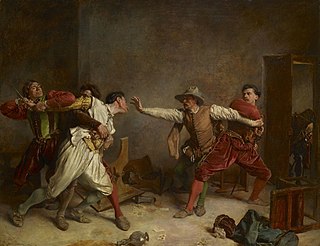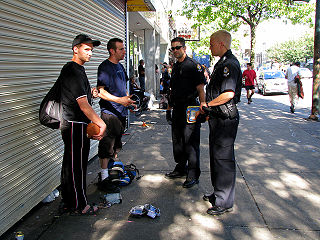Related Research Articles

In many legal jurisdictions related to English common law, affray is a public order offence consisting of the fighting of one or more persons in a public place to the terror of ordinary people. Depending on their actions, and the laws of the prevailing jurisdiction, those engaged in an affray may also render themselves liable to prosecution for assault, unlawful assembly, or riot; if so, it is for one of these offences that they are usually charged.

Theft is the act of taking another person's property or services without that person's permission or consent with the intent to deprive the rightful owner of it. The word theft is also used as a synonym or informal shorthand term for some crimes against property, such as larceny, robbery, embezzlement, extortion, blackmail, or receiving stolen property. In some jurisdictions, theft is considered to be synonymous with larceny, while in others, theft is defined more narrowly. Someone who carries out an act of theft may be described as a "thief".

The Theft Act 1968 is an Act of the Parliament of the United Kingdom. It creates a number of offences against property in England and Wales. On 15 January 2007 the Fraud Act 2006 came into force, redefining most of the offences of deception.

The Theft Act 1978 is an Act of the Parliament of the United Kingdom. It supplemented the earlier deception offences contained in sections 15 and 16 of the Theft Act 1968 by reforming some aspects of those offences and adding new provisions. See also the Fraud Act 2006.
Assault occasioning actual bodily harm is a statutory offence of aggravated assault in England and Wales, Northern Ireland, the Australian Capital Territory, New South Wales, Hong Kong and the Solomon Islands. It has been abolished in the Republic of Ireland and in South Australia, but replaced with a similar offence.

The Malicious Damage Act 1861 is an Act of the Parliament of the United Kingdom of Great Britain and Ireland. It consolidated provisions related to malicious damage from a number of earlier statutes into a single Act. For the most part these provisions were, according to the draftsman of the Act, incorporated with little or no variation in their phraseology. It is one of a group of Acts sometimes referred to as the Criminal Law Consolidation Acts 1861. It was passed with the object of simplifying the law. It is essentially a revised version of an earlier consolidation Act, the Malicious Injuries to Property Act 1827, incorporating subsequent statutes.

Possession of stolen goods is a crime in which an individual has bought, been given, or acquired stolen goods.
Making off without payment is a statutory offence in England and Wales, Northern Ireland, Republic of Ireland and Hong Kong. It was first introduced on the recommendation of the Criminal Law Revision Committee and is intended to protect legitimate business concerns and applies where goods are supplied or a service is performed on the basis that payment will be made there and then. A taxi passenger who runs off without paying the fare at the end of the journey; and a motorist who fills up with petrol at a garage and drives off when the attendant is distracted. For these purposes, it must be proved that the defendant knew that payment on the spot was required or expected, and made off dishonestly with intent to avoid payment of the amount due.
Obtaining pecuniary advantage by deception was formerly a statutory offence in England and Wales and Northern Ireland. It was replaced with the more general offence of fraud by the Fraud Act 2006. The offence still subsists in certain other common law jurisdictions which have copied the English criminal model.
Obtaining property by deception was formerly a statutory offence in England and Wales and Northern Ireland.
Polygamous marriages may not be performed in the United Kingdom, and if a polygamous marriage is performed, the already-married person may be guilty of the crime of bigamy under section 11 of the Matrimonial Causes Act 1973.
Burglary is a statutory offence in England and Wales.

The Official Secrets Act 1920 is an Act of the Parliament of the United Kingdom.
Abstracting electricity is a statutory offence of dishonestly using, wasting, or diverting electricity, covered by different legislation in England and Wales, Northern Ireland and the Republic of Ireland. The law applies, for instance, in cases of bypassing an electricity meter, reconnecting a disconnected meter, or unlawfully obtaining a free telephone call. In Low v Blease [1975] Crim LR 513 it was held that electricity could not be stolen as it is not property within the meaning of section 4 of the Theft Act 1968. In one reported case in 2015 a man was arrested for abstracting electricity by charging his mobile telephone on a train, but was ultimately not charged. Before the Computer Misuse Act 1990 those who misused computers ("hackers") were charged with abstracting electricity, as no other law applied.
Removing article from place open to the public is a statutory offence in England and Wales and Northern Ireland.
Evasion of liability by deception was formerly a statutory offence in England and Wales and Northern Ireland.
Obtaining services by deception is a statutory offence in the Republic of Ireland. It has been abolished in England and Wales and Northern Ireland.
Assault with intent to resist arrest is a statutory offence of aggravated assault in England and Wales and Northern Ireland and the Republic of Ireland.
Soliciting to murder is a statutory offence of incitement in England and Wales and Northern Ireland and the Republic of Ireland.

The Perjury Act 1911 is an Act of the Parliament of the United Kingdom. It creates the offence of perjury and a number of similar offences.
References
- ↑ Digitised copy of section 17 of the Theft Act 1968 from Legislation.gov.uk.
- ↑ Scott v Metropolitan Police Commissioner [1975] AC 819 at 836, per Viscount Dilhorne
- ↑ The Magistrates' Courts Act 1980, section 17(1) and Schedule 1, paragraph 28
- ↑ The Theft Act 1968, section 17(1)
- ↑ The Magistrates' Courts Act 1980, section 32(1)
- ↑ The Visiting Forces Act 1952, section 3(6) and Schedule, paragraph 3(g) (as inserted by the Theft Act 1968, Schedule 2, Part III)
- ↑ The Criminal Justice Act 1993, section 1(2)(a)
- ↑ The Visiting Forces Act 1952, section 3(6) and Schedule, paragraph 3(g) (as inserted by the Theft Act (Northern Ireland) 1969, Schedule 3, Part III)
- ↑ The Magistrates' Courts (Northern Ireland) Order 1981 (S.I. 1981/1675 (N.I. 26)), article 45 and paragraph 20 of Schedule 2 (as substituted by article 3(2) of, and Schedule 2 to, the Criminal Justice (Northern Ireland) Order 1986 (S.I. 1986/1883 (N.I. 15)
- ↑ The Theft Act (Northern Ireland) 1969, section 17(1)
- ↑ The Magistrates' Courts (Northern Ireland) Order 1981 (S.I. 1981/1675 (N.I.26)) ation.gov.uk/nisi/1981/1675/article/46 article 46(4)]
- ↑ The Criminal Justice Act 2011, section 3(1)(a) and paragraph 23 of Schedule 1